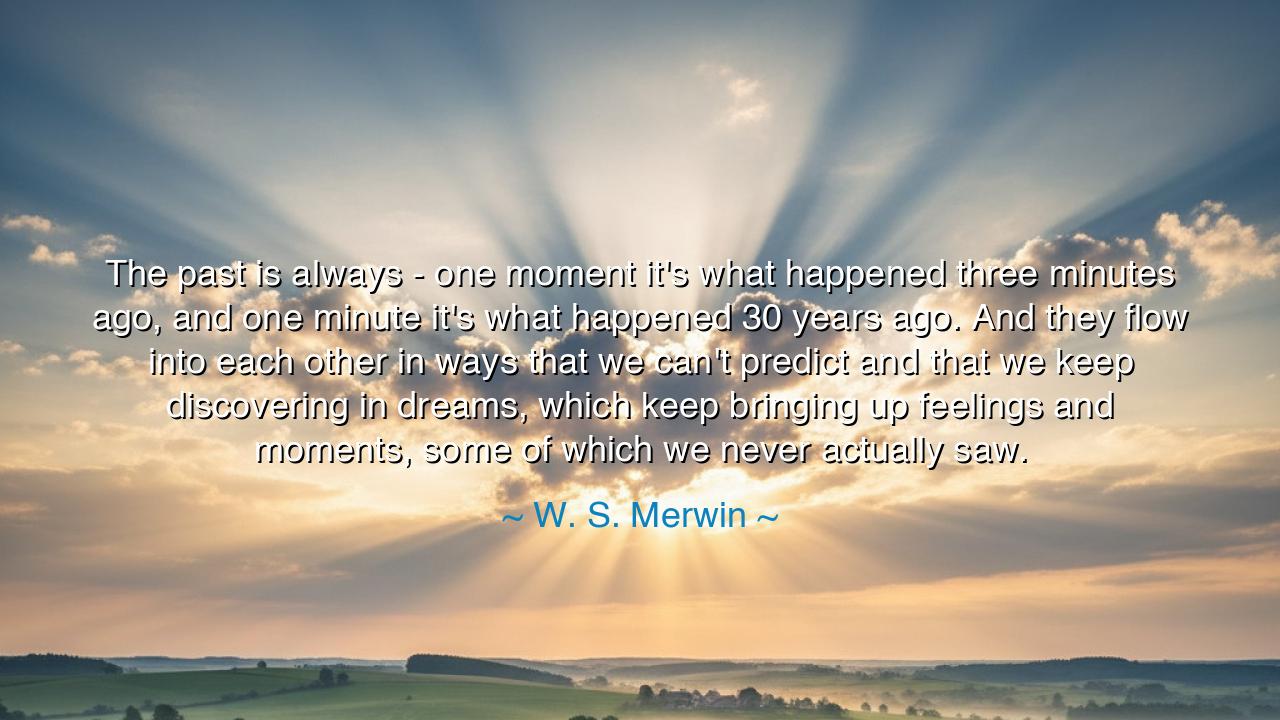
The past is always - one moment it's what happened three minutes
The past is always - one moment it's what happened three minutes ago, and one minute it's what happened 30 years ago. And they flow into each other in ways that we can't predict and that we keep discovering in dreams, which keep bringing up feelings and moments, some of which we never actually saw.






The words of W. S. Merwin, poet of silence and memory, drift through the air like the whisper of time itself: “The past is always — one moment it's what happened three minutes ago, and one minute it's what happened 30 years ago. And they flow into each other in ways that we can't predict and that we keep discovering in dreams, which keep bringing up feelings and moments, some of which we never actually saw.” In this meditation, Merwin speaks as one who has listened deeply to the river of time—not as a scholar measures it by the ticking of clocks, but as a soul feels it within the pulse of remembrance. His words reveal that the past is not a distant country, as some have said, but a living presence that moves within us, shifting like wind through the corridors of thought and dream.
W. S. Merwin, one of the most luminous poets of the twentieth century, was a man who walked softly upon the world. His poetry, stripped of punctuation and ornament, moves with the rhythm of breath and meditation. Having lived through wars, environmental destruction, and the turning of ages, he came to see time not as linear, but as circular, flowing and returning like waves upon the shore. When he speaks of the past “flowing into each other,” he describes this eternal current—the truth that memory is not fixed, but alive, reshaping itself each moment we recall it. For to remember is not to look backward, but to live again; every act of recollection gives new birth to what once was.
His insight reaches into the realm of dreams, those mysterious landscapes where time dissolves and the boundaries of memory blur. There, we encounter faces we have forgotten, voices we have never heard yet somehow recognize, and moments we never actually saw—echoes, perhaps, of ancestral memory, or the deep unconscious weaving stories from fragments of our souls. In this way, Merwin suggests that the past is not merely what we lived, but also what we inherit, what we imagine, and what we carry in the depths of our being without ever understanding its origin. The dream becomes the meeting place of times—where childhood and age, history and myth, are gathered into one silent vision.
Consider the story of Marcel Proust, who once tasted a madeleine dipped in tea and was flooded with the sensations of his entire youth. In that single flavor, decades collapsed; memory became present, and the present dissolved into memory. Like Merwin, Proust discovered that the past is not behind us—it is within us, awaiting its awakening through some hidden key: a scent, a song, a dream. Time, he realized, does not move like an arrow, but folds upon itself like petals of an eternal flower. In this way, both poet and novelist teach us that our lives are not a straight path, but a spiral through which we return again and again to moments long thought forgotten.
Merwin’s reflection also carries the quiet ache of impermanence. If the past flows freely into the present, it means that nothing is ever truly lost—but neither is anything ever still. The joys we once knew, the sorrows we have endured, continue to shape us, whispering through our emotions and choices. Sometimes they appear in dreams, not to haunt us, but to remind us that we are made of everything we have lived. Even the moments we never saw—those that belonged to our ancestors, or to the collective memory of humankind—live within us, shaping our compassion and our fear. Thus, to know oneself fully is to listen to the echoes of history resounding in the soul.
In his gentle wisdom, Merwin shows us that memory is not a record—it is an art. Each time we remember, we reimagine. The past becomes a story we continue to tell, a river we step into again and again, though its waters have changed. This means that healing, too, is possible—for if memory can flow, it can also cleanse. The pain of yesterday can be reshaped into the wisdom of today. The lost love, the broken promise, the fleeting joy—all are not gone, but transformed within the living current of consciousness. To dwell in this truth is to find peace, for it means that nothing in life, however brief, is ever wasted.
Therefore, O listener, take this teaching to heart: do not treat the past as a prison, nor as a ghost to be feared. See it instead as a garden of living roots, whose branches grow through your present and into your future. When you dream, when you remember, when an old song stirs tears in your eyes, do not turn away. For in those moments, you are communing with the vast continuum of existence itself—the mysterious tapestry that binds the three minutes ago with the thirty years past, and even the centuries before your birth.
And when you awaken from such a dream, give thanks. For as W. S. Merwin teaches, the past is not gone; it is ever arriving, ever shaping, ever revealing. To live wisely, therefore, is not to escape the past, but to walk with it—to allow its river to flow through you without resistance. In this way, you will discover that time is not your enemy but your companion, and that every memory, even those unseen, are part of the eternal song of your becoming.






AAdministratorAdministrator
Welcome, honored guests. Please leave a comment, we will respond soon